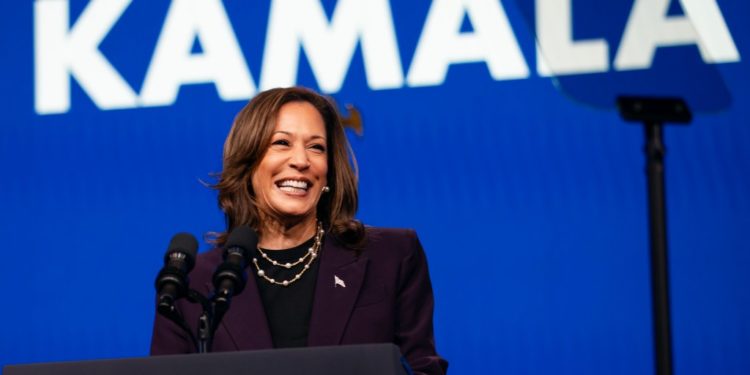I took a long walk around the neighborhood this week. Those unnerving ‘Dark Brandon’ campaign signs—the ones with fiery, X-ray vision eyes on a big Biden head—were gone. But the Harris for President signs hadn’t shown up yet.
Any day now, of course, they will. A quick online check showed a full array of Harris gear for already sale, much of it ‘awaiting fulfillment,’ given the abrupt shift in the Democrats’ Presidential alignment.
Inevitably, a lot of the lawn signs will wind up here, on the prosperous North end of Santa Monica, where progressive politics are pretty much taken for granted. Still, Kamala Harris, Joe Biden’s preferred successor, might be wishing these folks, her neighbors, more or less, would cool it just a bit.
After all, this isn’t a great time for a candidate to be identified with the very heartland of entitlement.
North-of-Montana Ave. Santa Monica is actually Kamala-adjacent. Harris and her husband, the lawyer Douglas Emhoff, own a home in adjoining Brentwood, in a leafy stretch that ranges from the long-time Mel Brooks place on Santa Monica’s La Mesa Drive to the old Marilyn Monroe home near Gretna Green Way, and up the hill above Sunset, where Michael Ovitz and O. J. once held sway.
Houses are roomy and sometimes large. Security is attentive. The taco trucks alongside the Brentwood Country Club are where day labor dines. Locals are more likely to lunch in the Brentwood Country Mart, where Michael Mann and his pals held court through the years, and meat from the butcher counter sells by the quarter-pound, making an eighty-dollar rib-eye at first glance look affordable.
Harris and Emhoff make a point of frequenting El Cholo, an unpretentious Mexican restaurant closer to downtown Santa Monica. But right through her Vice-Presidential years, Harris and Emhoff have seemed comfortable in the more northerly entertainment enclave, where famous faces and those who represent or produce or direct them are just another fact of life. I’ve run into Jon Favreau walking, Ben Affleck dropping a kid off at school, and Gwyneth Paltrow scooting into the wine store, possibly on her way to visit with her mother, Blythe Danner. Agents. Writers. Lots of producers. At one point, Shirley Temple. Come to think of it, my wife grew up in a house that had belonged to Stan Laurel, and some close friends up the street got their place from a Laemmle.
This is Celebrity Land—a very long way from Butler, Pa., where Trump was attacked (and near where I spent childhood in a factory town, Ford City). Butler is more like East Palestine, Ohio, where the train derailed, not far away.
In some years, granted, the glamour factor is a plus. It certainly helped Ronald Reagan, Arnold Schwarzenegger, and even Trump, though the latter two, at least, had great fame without matching celebrity support. And star backing certainly didn’t hurt Bill Clinton or Barack Obama.
But it’s a much tougher equation this year. Hollywood is politically suspect, having banged the drum and passed the hat for Biden only days before declaring him unfit to run. Show business donors dumped their own candidate—who complained bitterly of betrayal by the elite—only to flock, within hours of Biden’s resignation, to Harris, his heir.
It might work. But it was unseemly—the sort of thing you can pull when you’re packaging a movie, but not when you’re asking for trust from a electorate that is sore about inflation, worried about global conflict, and tired of trying to figure out whether anyone in government or the media ever deals in simple truth.
The instant flood of Hollywood money to Harris is welcome, I’m sure. But celebrity endorsements, even from George Clooney, won’t be a big help this year. And Brentwood will probably count for less than Butler.
The post Michael Cieply: Will The Hollywood Glam Factor Hurt Kamala Harris? appeared first on Deadline.



















